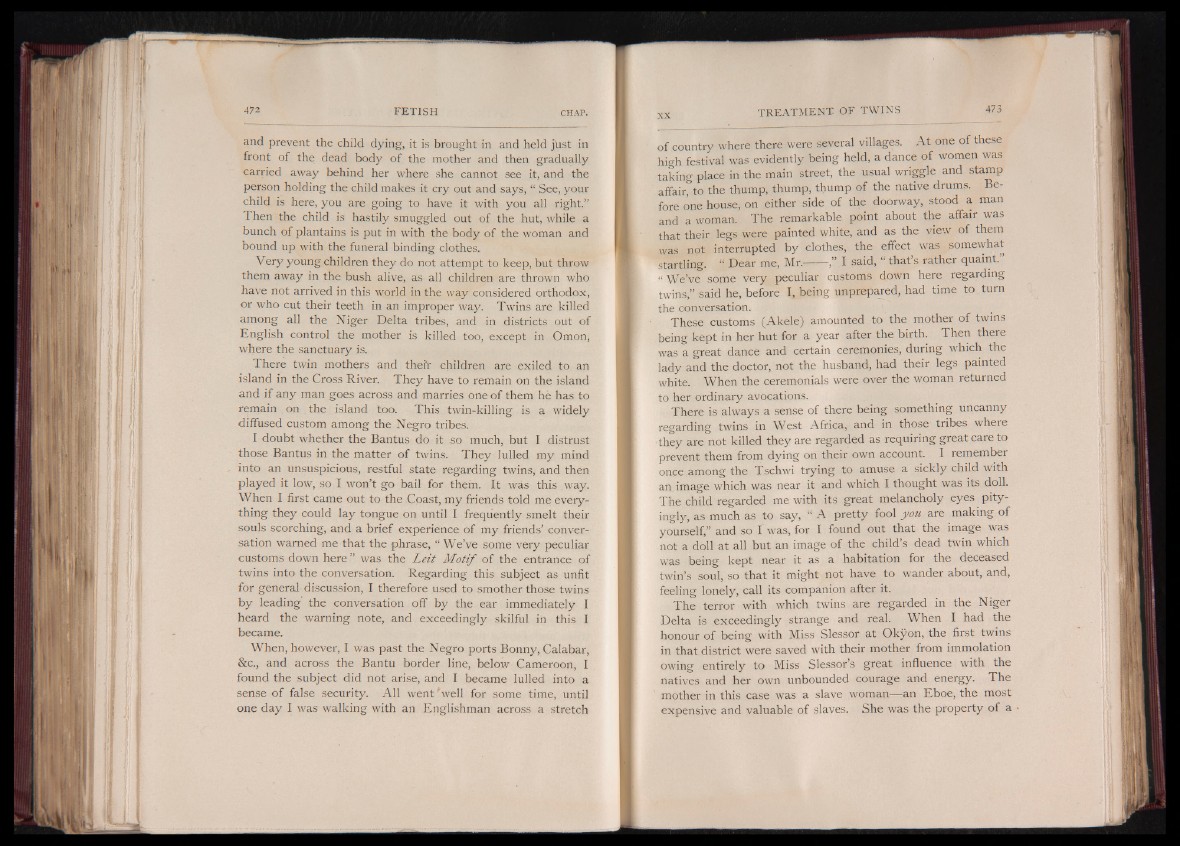
and prevent the child dying, it is brought in and held just in
front of the dead body of the mother and then gradually
carried away behind her where she cannot see it, and the
person holding the child makes it cry out and says, “ See, your
child is here, you are going to have it with you all right.”
Then the child is hastily smuggled out of the hut, while a
bunch of plantains is put in with the body of the woman and
bound up with the funeral binding clothes.
Very young children they do not attempt to keep, but throw
them away in the bush alive, as all children are thrown who
have not arrived in this world in the way considered orthodox,
or who cut their teeth in an improper way. Twins are killed
among all the Niger Delta tribes, and in districts out of
English control the mother is killed too, except in Omon,
where the sanctuary is.
There twin mothers and their children are exiled to an
island in the Cross River. They have to remain on the island
and if any man goes across and marries one of them he has to
remain on the island too. This twin-killing is a widely
diffused custom among the Negro tribes.
I doubt whether the Bantus do it so much, but I distrust
those Bantus in the matter of twins. They lulled my mind
into an unsuspicious, restful state regarding twins, and then
played it low, so I won’t go bail for them. It was this way.
When I first came out to the Coast, my friends told me everything
they could lay tongue on until I frequently smelt their
souls scorching, and a brief experience of my friends’ conversation
warned me that the phrase, “ We’ve some very peculiar
customs down here ” was the Leit M otif of the entrance of
twins into the conversation. Regarding this subject as unfit
for general discussion, I therefore used to smother those twins
by leading the conversation off by the ear immediately I
heard the warning note, and exceedingly skilful in this I
became.
When, however, I was past the Negro ports Bonny, Calabar,
&c., and across the Bantu border line, below Cameroon, I
found the subject did not arise, and I became lulled into a
sense of false security. All went'well for some time, until
one day I was walking with an Englishman across a stretch
of country where there were several villages. A t one of these
high festival was evidently being held, a dance of women was
taking place in the main street, the usual wriggle and stamp
affair, to the thump, thump, thump of the native drums. Before
one house, on either side of the doorway, stood a man
and a woman. The remarkable point about the affair was
that their legs were painted white, and as the view of them
was not interrupted by clothes, the effect was somewhat
startling. “ Dear me, Mr. ,” I said, “ that’s rather quaint.
“ We’ve some very peculiar customs down here regarding
twins,” said he, before I, being unprepared, had time to turn
the conversation.
These customs (Akele) amounted to the mother of twins
being kept in her hut for a year after the birth. Then there
was a great dance and certain ceremonies, during which the
lady and the doctor, not the husband, had their legs painted
white. When the ceremonials were over the woman returned
to her ordinary avocations.
There is always a sense of there being something uncanny
regarding twins in West Africa, and in those tribes where
they are not killed they are regarded as requiring great care to
prevent them from dying on their own account. I remember
once among the Tschwi trying to amuse a sickly child with
an image which was near it and which I thought was its doll.
The child regarded me with its great melancholy eyes pityingly,
as much as to say, “ A pretty fool you are making of
yourself,” and so I was, for I found out that the image was
not a doll at all but an image of the child’s dead twin which
was being kept near it as a habitation for the deceased
twin’s soul, so that it might not have to wander about, and,
feeling lonely, call its companion after it.
The terror with which twins are regarded in the Niger
Delta is exceedingly strange and real. When I had the
honour of being with Miss Slessor at Okyon, the first twins
in that district were saved with their mother from immolation
owing entirely to Miss Slessor’s great influence with the
natives and her own unbounded courage and energy. The
mother in this case was a slave woman— an Eboe, the most
expensive and valuable of slaves. She was the property of a